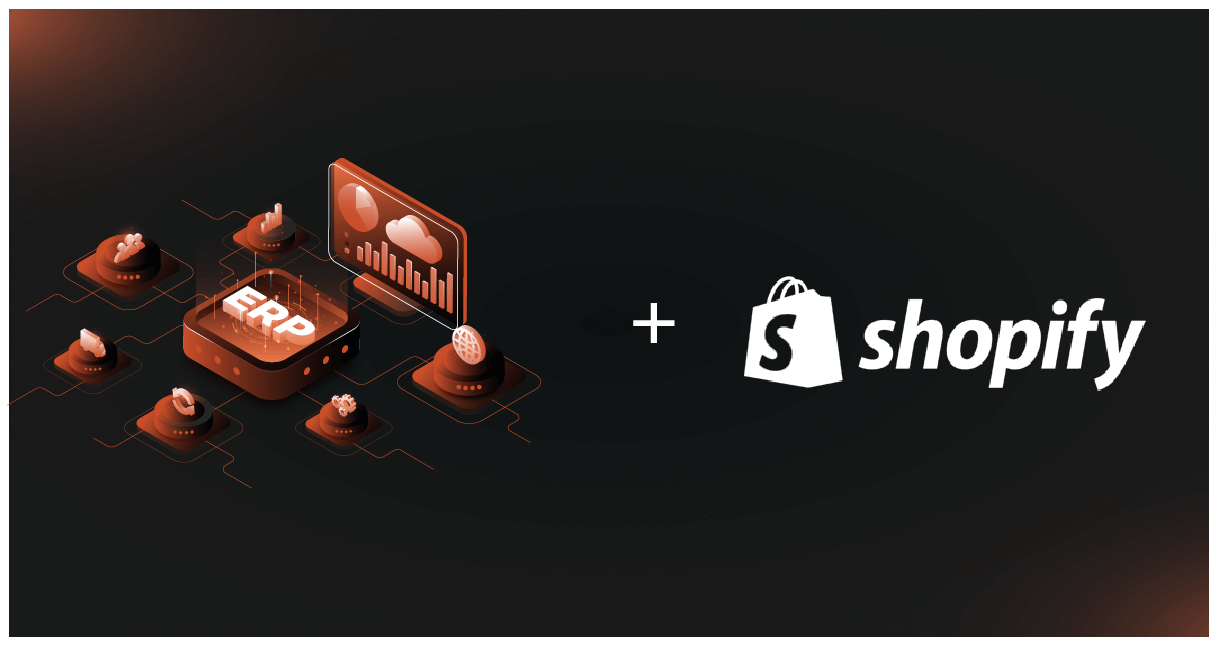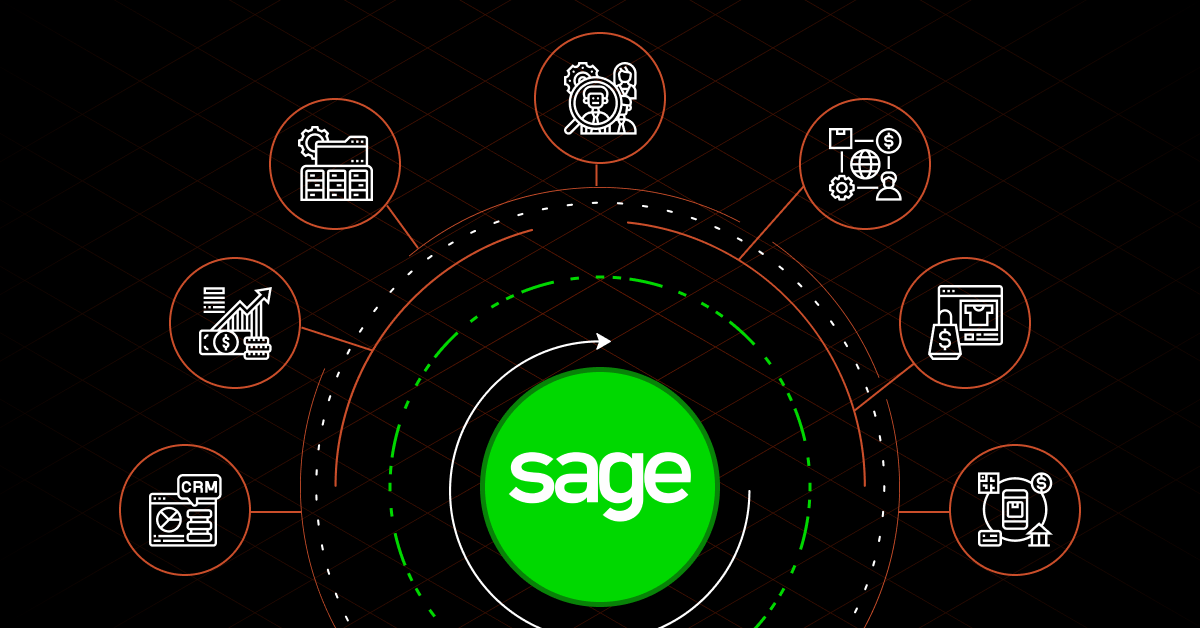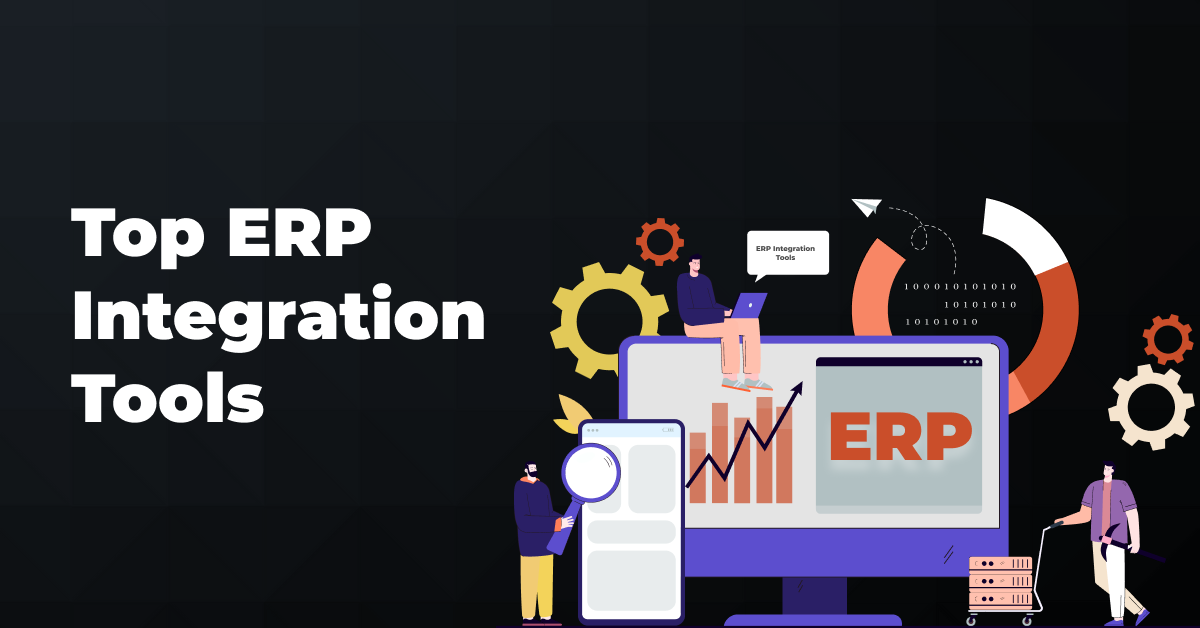Enterprise resource planning software or ERP is at the core of the success of ecommerce businesses. Usually, different aspects of an ecommerce store such as inventory, communications, and accounts payable or receivable are managed by separate applications and unique processes, necessitating everything to work seamlessly.
This is where a centralized ERP and wisely chosen integrations can accelerate your growth. If you are planning ERP integration with Shopify, then keep reading as we share all the details you need for a robust connection.
Contents
Understanding ERP Integration with Shopify
ERP integration with Shopify means that your ERP and Shopify store are seamlessly connected and automatically communicating with each other. It allows data entry and easy access in a centralized place without having to switch between the systems.
Consider this. Your ERP handles activities like supply chain management, accounts, payable, HR, and other business operations. The backend of your Shopify store handles inventory, processes orders, and completes payments. When the ERP platform is integrated with Shopify, the two work in tandem and get work done easily.
Preparing for ERP Integration with Shopify
Before you get started, follow these steps to ensure you are on the right track.
Step 1: Identify Critical or Relevant Data
Determine which information is most important for your business to integrate. This can include financial details, order data, product data, customer data, order processing data, etc.
Step 2: Determine Manual, Error-Prone Processes
Figure out which of the business processes are repetitive or inefficient and impact your team’s productivity. These are the tasks that you need to prioritize and automate when integrating.
Step 3: Identify Whether the Chosen ERP Integrate with Shopify
Determine if you would want to deploy your ERP in the cloud or on-premise. This decision may depend on security and the volume of data. You can either choose software suites, all-purpose models, custom modules, etc.
Step 4: Determine the Integration Method
There are multiple options to integrate ERP with your Shopify store. You can use Shopify’s APIs (application programming interface), your ERP’s native ecommerce integration capability, or a third-party integration solution. Let’s delve into this more.
Related read: The Distributor’s Guide to Shopify and Prophet 21 Integration
ERP Integration with Shopify: Common Methods
Here are some most common methods for Shopify ERP integration that you can consider.
Custom Integration Using APIs
In this method, the programmers or developers can use Shopify’s API code and match it with the ERP system to be integrated. Here, the businesses develop their own custom integration and are completely responsible for managing it as well.
Pros
It offers the flexibility for customization and can be done in-house (if you have the expertise).
Cons
This method requires deep technical expertise and knowledge and can be time-consuming.
Native or Vendor-Built Integration
In this ERP integration method, businesses can utilize the ERP’s native integration to connect with Shopify. For instance, many ERPs can directly connect to Shopify—the Shopify Global ERP Program includes a suite of certified ERP platforms that connect with your Shopify store. Microsoft, Oracle NetSuite, Infor, Acumatica, and Brightpearl partnered with Shopify to enable integration without third-party implementations.
It is an extension of the Shopify Plus Certified App Partner Program. For more relevant information, you can explore the Shopify App Store.
Pros
It covers common use cases for merchants and may not include additional subscription costs.
Cons
There are limitations in terms of flexibility and customization.
Integration Platform as a Service (iPaaS) or Middleware
iPaaS is a cloud-based integration platform that helps build and deploy any number of integrations, whether on-premise or in-cloud. Since it leverages cloud technology, it offers scalability, faster synchronization, and quick implementation. For instance, DCKAP Integrator, which is a market-leading iPaaS solution designed for distributors eliminates the need for any hardware to integrate your Shopify ERP systems.
Pros
Low-code iPaaS simplifies integration by connecting different systems, applications, data centers, data warehouses, etc.
Cons
Limitations may vary depending on the iPaaS software vendors. Even the functionalities offered by ERP vendors can have an impact on your integration project.
What Are the Benefits of ERP Integration with Shopify
ERP integration provides a complete overview of applications in a large enterprise, sharing better insights on data quality and performance. It also enables ecommerce business owners to consolidate legacy systems which may or may not be compatible with new applications into a single platform with one source of truth.
Thus, with the right ERP system in place, integrating it with the Shopify platform can benefit both your business as well as employees.
Improved and Personalized Customer Experience
Your customers will notice the benefits of ERP Shopify integration. To remain competitive, you need to serve customer needs on multiple sales channels for a holistic experience. With integration, they will have a smoother and better customer experience with enhanced CRM functionality along with automated shipping, tracking, and payment.
Easy Data Access
Although ERP allows you to view all data in one place, integrating it with your e-commerce platform will enable you to access customer data in real-time. This will result in faster decision-making and a single source of truth.
Moreover, with integrated data, no data or necessary information is in silos, simplifying report-making. This will make tax compliance hassle-free and easier.
Better Process Visibility
Integrated Shopify and ERP means your processes are automated, simplified, and easy to manage. Automating repetitive tasks reduces human error and streamlines the operations. With higher efficiency, you can expect reduced processing times and better conversions. This results in overall improved customer satisfaction.
Cost-Savings
ERP integration with Shopify enables you to take control of your inventory in real-time, ensuring just-in-time inventory management. This means you only buy or manufacture what is needed. So, the Shopify ERP integration is not only saving your hours but money too.
DCKAP Integrator: The Perfect Solution for Shopify ERP Integration
Among a plethora of ERP vendors, DCKAP Integrator stands out as the industry-leading integration solution for distributors. A cloud-based, low-code iPaaS, it seamlessly connects and synchronizes data across various systems, applications, and databases such as CRM, ERP, and ecommerce, whether on-premise or in-cloud.
The following features and benefits make it the preferred solution for Shopify ERP integration.
- Plug-and-play integration solution, eliminating the need for specific coding knowledge
- Smooth user experience with an intuitive, versatile, and easy-to-use interface
- Custom APIs for multiple integrations
- Drag-and-drop functionality for quick project development
- A central dashboard for organization-wide analytics
- Clear and better results for comprehending your unique business requirements
- Enhances cross-channel collaboration while making it easier to handle teams, sale funnels, and order fulfillment
- Robust customer service and technical support
Challenges of Shopify ERP Integration
Although the benefits of integrating ERP with your online store are numerous, you may encounter some roadblocks if not planned properly.
- Outdated software systems: In case your systems haven’t been upgraded with new updates, especially the ERP, then connecting with the Shopify platform can result in additional work. This is primarily because ERP systems handle a majority of business operations and shifting over can be complex.
- Cost: Undoubtedly, new systems can be costly, especially for a small company. Because of the high upfront costs. Although ERP implementations do give you the ROI in the long term, some financial planning might be needed for upfront investment.
- Customization: If your existing ERP or Shopify store has already been customized, then the regular integration strategies may not work for you. You might need a tailored plan to integrate those customizations.
- Non-standardized data: Ecommerce houses different types of data that can make integration a bit complex. Since different systems store data in various formats, some information can be difficult to categorize. So, depending on systems compatibility, you may need to move data to a new platform or implement a new platform that can communicate with your existing one.
Best Practices for ERP Integration with Shopify
Follow these best practices for smooth and seamless integrations.
Prepare a Foolproof Integration Plan
Understand the company’s internal business systems and goals and include all stakeholders to get an overview of the hurdles that the project can encounter. Figure out all the use cases and their frequency. Apart from that, try to gather information on the following.
- Reasons for integrating Shopify business and ERP
- The information that will flow from the Shopify store to the ERP and from the ERP to the store
- Gaps in your inventory data
- Whether you need to integrate other systems such as workforce management
Keep Employees, Vendors, and Leadership Informed
Businesses may encounter some resistance when integrating your ERP with Shopify. Since integration may bring changes in your processes, roles, routines, and other tasks, there may be some roadblocks from different stakeholders. Even users who are using a modern, cloud-based ERP system may experience changes to their processes and may need to adapt to new workflows. That is why communication is critical for your project.
Follow Good Data Management Practices
You need to be mindful of data management practices for Shopify ERP integration. Clean, standardized, and authenticated data is required for generating useful insights that may have an impact on your business performance. Make sure you clean the data and normalize the formats, validate it to maintain accuracy, review the access controls, and remove bad or duplicate data. This will help in a smooth and faster integration process.
Remember: Standalone ERP Solutions Can Leave Gaps
ERP software such as Microsoft Dynamics 365 Business Central, Salesforce, Oracle Netsuite, or SAP, connects and consolidates day-to-day business activities— financial management, accounting, supply chain management (SCM), inventory management, customer relationship management (CRM), human resources (HR), project management, and others. However, an out-of-the-box ERP may be an incomplete answer for your ecommerce business needs.
If you are using Shopify, then it is high time to connect your ecommerce system and ERP. When working together, the two systems can not only enhance the functionality of your ecommerce store but also provide a better customer experience.
Additionally, necessary information such as sales orders, taxes, shipping, customer data, leads, and even customer service can be easily managed through Shopify ERP integration. Here, the primary goal of integration is to ensure that everyone in the company who handles the ecommerce store has access to real-time data.
When done right, seamless integration translates to synchronization, bi-directional data exchange or data flow, and automation of various business processes. It ultimately improves the operational efficiency, visibility, and decision-making capabilities of your online business.
Final Words
Without a doubt, Shopify ERP integration is the foundation for the success of your ecommerce business. It automates processes, centralizes and consolidates data, improves efficiency, and improves confidence and collaboration among your team. Moreover, you can provide more value to your customers and grow your business.
However, integrations can be complex without the right partner. Consider DCKAP Integrator for a customized integration solution that benefits your customers, business, and your bottom line. To schedule a demo, get in touch with us today.




